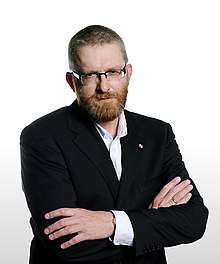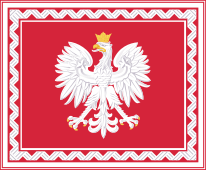Grzegorz Braun
| Grzegorz Braun | |
|---|---|
 Grzegorz Braun (2018) | |
| Born |
11 March 1967 Toruń, Poland |
| Education | University of Wrocław, University of Silesia |
| Occupation | Journalist, movie director |
Grzegorz Michał Braun (born March 11, 1967) is a Polish journalist, academic lecturer, movie director, screenwriter and politician.
Biography
Grzegorz Braun was born in Toruń, Poland. His father, Kazimierz Braun, is a movie director. His mother is Zofia, née Reklewska, while his maternal grandfather was Wincenty Sebastian Reklewski. Grzegorz is the nephew of the Telewizja Polska former network director Juliusz Braun and the brother of actress Monika Braun.
In 1987 he graduated from the University of Wrocław. In 1993 he completed postgraduate studies at the Krzysztof Kieślowski Faculty of Radio and Television at the University of Silesia in Katowice. Since 1987, he co-organized activities of the Orange Alternative, for which he was oppressed by the communist government of the Polish People's Republic. In 1988 and 1989, he participated in the student protests at the University of Wrocław. He was also active in the Polish-Czech-Slovak Solidarity.
Later, he also was a journalist for, inter alia, the Option Right [1] and the Polskie Radio Wrocław. Until 2007, he taught journalism at the University of Wrocław. As a movie director, he had produced and directed over 20 titles, including: Transformation, New Poland, Correction to Biography, Positive Additions and Negative Additions, Comrade General Goes to War, Martin Luther and the Protestant Revolution, Smolensk Assassination. He is a co-founder of the Errata TV series, revealing the biographies of former Polish communist agents.
He was involved with the Polish Monarchists Organization,[2] for which he contributed written works and lectures. He is currently involved with "Awakening" ("Pobudka") an organisation that he has founded [3] to strengthen the self-sustainability of faith communities and the internet TV channel "Sumienie Narodu." [4]
Political activity
Braun's political views are based on the assessment of Polish history with special insight to the 1050th anniversary of Poland's acceptance of Christianity. He is opposed to the idea of Poland being a state dependent of and controlled by the European Union. He believes that Poland's continuous prosperity can only be guaranteed by the preservation of the traditional family values, the principles of Roman Catholic faith and the faith-based education. His political views are far-right, and he sympathizes with ONR and other Polish nationalist organizations. He is proponent of revisions to the legacy of former president Lech Wałęsa based on the Wałęsa's alleged cooperation with the communist secret service. He is a proponent of revisions to the current Polish government's investigation of the 2010 Polish Air Force Tu-154 crash (Polish presidential airplane crash) at Smolensk. He is a proponent of revisions to the current Polish government's international trade agreements and political conventions. His economic views can be described as liberal as he supports tax per head idea and cutting VAT tax.
On January 24, 2015 he announced his candidacy to run for the office of the President of Poland. In February 2015 he started campaigning in the United States among Polish immigrants and Americans of Polish descent. On August 5, 2015, he formed his own campaign committee God Bless You! (Szczęść Boże!) while receiving only 13,113 votes amounting to a 0,09% of the total cast he withdrew from the parliamentary elections in the fall of 2015.
In August 2016, Grzegorz Braun took part in a conference organized by the Center for European Policy Analysis reporting on Russian propaganda in the former Soviet satellite countries. He suggested maintaining a controlled balance between EU and Russia.[5] National movement presidential candidate Marian Kowalski criticized Grzegorz Braun for not trusting NATO forces stationing in Poland as a legitimate defence against Russia.[6] Grzegorz Braun calls for Poland to independently maintain and operate nuclear weapons.
References
- ↑ Option Right "Option Right Magazine" Retrieved on 4 March 2015.
- ↑ "Organizacja Monarchistów Polskich" Retrieved on 4 March 2015.
- ↑ https://www.pobudka.org/
- ↑ https://www.youtube.com/channel/UCk3el50gstUIdnGtWO_cqTw
- ↑ https://cepa.ecms.pl/files/?id_plik=2706
- ↑ https://www.youtube.com/watch?v=5kPyutKMIO0
